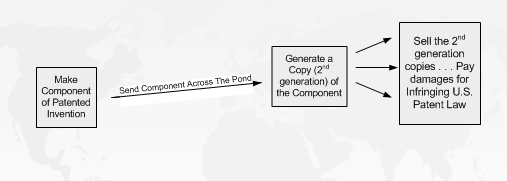“Exporting this brief could violate 35 U.S.C. Section 271(f) under the Panel’s mistaken construction of that statute.”
So begins the Amicus brief submitted by Bentley Systems, et al., in support of Microsoft’s petition for rehearing in Eolas v. Microsoft (Golden Master I). Bentley goes on to argued that the Court should maintain a principled and clear distinction between (a) supplying physical components of a physical patented invention, versus (b) supplying engineering design information that can be used to manufacture components of a patented invention.
In Eolas v. Microsoft, a three member appellate panel at the Federal Circuit appears to have expanded the scope of Section 271(f) – a statute that creates a cause of action for infringement due to foreign sales when a component of a patented invention is supplied from the U.S., knowing that the component will be combined in an infringing manner outside the U.S. Microsoft had shipped a “Golden Master” of computer code for Internet Explorer (IE) to its foreign suppliers who then copied the disk and sold the copies on foreign soil. This activity was seen as infringing, even though the patented invention was not practiced until at least the 3rd step above.
Of course, Microsoft agrees that the CAFC’s decision was mistaken. In its petition for a rehearing Microsoft argues that the that the panel decision is contrary to Pellegrini v. Analog Devices — a case that were virtually ignored by the CAFC opinion. In their brief, AOL & Intel agree that the panel’s application of 271(f) cannot be reconciled with Pellegrini and prior U.S. patent law. [AOL & Intel Amicus Brief].
As I have mentioned before, this case may have wide reaching effects. In its amicus brief, Shell Oil notes that the panel’s opinion overreached when it declared that “every form of invention eligible for patenting falls within the protection of section 271(f).” Specifically, Shell, one of the most multinational of corporations, is concerned that they will be found to be violating patented processes that were somehow exported from the U.S. [Shell Oil Amicus Brief].
In disagreeing with the CAFC decision, the Business Software Alliance (BSA) makes both a legal argument and a policy argument. On the legal side, BSA describes the Golden Master disks as templates that are not incorporated into patented inventions. Their argument, that is not controverted by the CAFC decision, is that 271(f) was not enacted to “ensnare companies that transmit know-how.” On the policy side, the BSA notes that the decision hurts U.S. software developers and adds another incentive to outsource such work to developers in another country. [BSA Amicus Brief].
It is difficult to even make an educated guess as to how long it may take for the Federal Circuit to decide the petition. In one case, a petition for rehearing has now been pending for almost a full year.
- Microsoft Petition for Rehearing
- Bentley Amicus
- Shell Oil Amicus
- AOL & Intel Amicus in support of rehearing (2328 KB)
- Business Software Alliance (BSA) Amicus in support of rehearing (591 KB)
Thanks to Joseph Milowic, Janine Carlan, Joe Miller and John Vandenberg for helping me locate the briefs.
